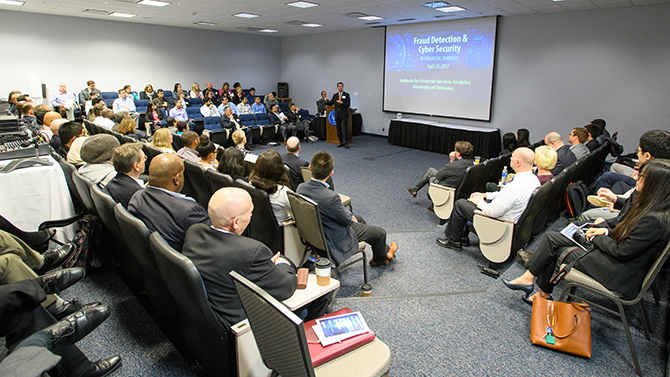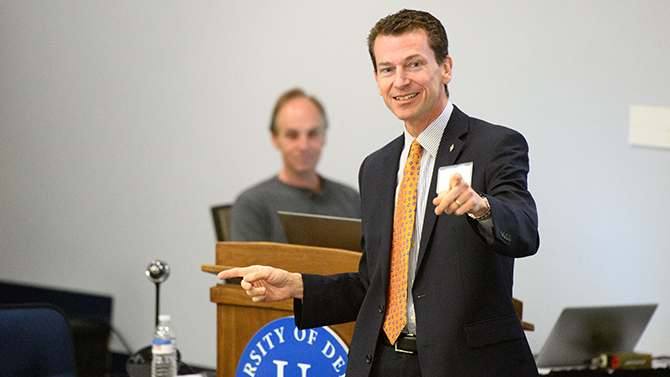

Keeping financial services cybersafe
Photos by Kathy F. Atkinson May 18, 2017
Experts discuss big data and cybersecurity in the financial services industry at UD conference
Maybe this has happened to you: When traveling, you attempt to make a purchase, but your card is declined. Your credit card company has marked your purchase attempt as potentially fraudulent, and you may have to contact your bank and verify your identity before you can do anything else. This leaves you feeling very inconvenienced and probably unsettled.
In order to reduce the likelihood of these situations, leaders in banking are working with big data to better predict when transactions are truly fraudulent. The ultimate goal is to “identify more, decline less and find more fraud.”
These were the words shared by one panelist at the University of Delaware’s Fraud Detection and Cyber Security in Financial Services Conference panel discussion, where banking experts discussed the future of technology in credit card fraud detection.
Sponsored by UD’s Institute for Financial Services Analytics (IFSA), the conference included multiple presentations as well as the panel discussion, which featured:
• Harold Paulson, senior director, Barclay’s;
• Jim Webb, senior director, Citibank;
• Tom Barton, risk management director, JPMorgan Chase;
• Joan Pappas, senior vice president, Bank of America; and
• Gus Cheatham, senior vice president/VP, Capital One.
Co-moderating the panel were Jimmy Li, business director of Capital One, and Bintong Chen, director of IFSA.
On the subject of the aforementioned mistaken declines, one panelist said that working with big data can help banking systems to “intuitively arrive at the conclusion that [your transaction] is not so odd.”
Other panelists discussed solutions that stress communication with customers – for example, a text message alert that gives customers the opportunity to easily confirm or deny the legitimacy of a purchase.
The panel also discussed challenges facing financial services analytics, like the need for bank card issuers to work with merchants to access more data.
“The question is always ‘Do we have enough data?’ and the answer is always ‘No,’” said another panelist. “You always want more data. I would love to have more participation from merchants sharing their data.
“Whatever business solutions we come up with, we have to figure out how to get the merchants to come along.”
“That’s a phenomenal point,” agreed another panelist. “From a banking perspective, we know the amount, and that’s about it.” The panelist discussed the need for “bridging between what issuers have and what merchants have.”
Another panelist discussed the inherent challenges of customer authentication.
“How do we know that the person on the other end of the telephone or the other end of the computer is who they report to be?” the panelist asked. “It goes well beyond assigning passwords.”
Complex issues like this, a panelist said, are why, “If I’m not investing, I’m losing. And I’m losing because the criminals are investing, but also because my competitors are investing.”
Despite the competition between the companies, however, the panelists stressed the importance of working together against the common threat of credit card fraud.
“What we’ve all found is that if one of us is being targeted, the others probably are as well,” a panelist said. The panelist discussed one solution of using third party firms to help different companies pull their data together.
Bruce Weber, dean of UD’s Alfred Lerner College of Business and Economics, also discussed the importance of collaborative fraud prevention in his remarks at the conference. Specifically, Weber talked about technology that can help professionals “move in the direction of collective intelligence.”
“If each team relies just on its perception of the threat, we’re not going to get to the place we need to be on this problem,” Weber said. “We need to pool the ‘wisdom of the crowd’ to fully enable us to deal with financial fraud in the digital era.”
Contributing to this effort, Weber continued, is UD’s unique doctorate in financial services analytics program, which combines data science, computer science and financial services operations.
These are the areas, Weber contested, that are the drivers of performance and risk at today’s financial services institutions.
This emphasis on data and computer science can also be seen in the larger world of finance, Weber said.
“We’ve moved from manual trading to electronic trading,” he explained. “The action now is in market participant firms where developers are writing algorithms to do trading, high-frequency order handling, electronic market-making, using machine learning and predictive analytics to figure out how to best participate and how to provide liquidity in the market.”
“We’ve focused on the wonderful benefits of technology, but some of the unforeseen consequences such as market disruptions and episodes of illiquidity now are starting to appear,” Weber said.
Discussing some of these unforeseen consequences was keynote speaker Hsinchun Chen, University of Arizona Regents’ Professor and Thomas R. Brown Chair Professor, who described his work with the dark web.
“I am collecting all the world’s information about hackers,” said Chen, a specialist in crime data mining. “I want to collect everything about every hacker in the world, that’s my goal.”
During his presentation, Chen discussed his recent Darknet Market and Hacker Web projects, as well as his experience studying “Rescator,” a credit card-selling hacker, by deploying listener robots into the deep web.
Chen also described his take on the latest changes in the cybersecurity industry, both in terms of technology and culture.
“The mindset changed from very reactive to more proactive,” he said. “It’s a community, an ecosystem of people.”
With annual conferences like this one, this community of experts, professionals, academics and leaders will continue to explore issues related to cybersecurity and financial services analytics – and, hopefully, will make nuisances like those mistaken declines a thing of the past.
Contact Us
Have a UDaily story idea?
Contact us at ocm@udel.edu
Members of the press
Contact us at 302-831-NEWS or visit the Media Relations website



